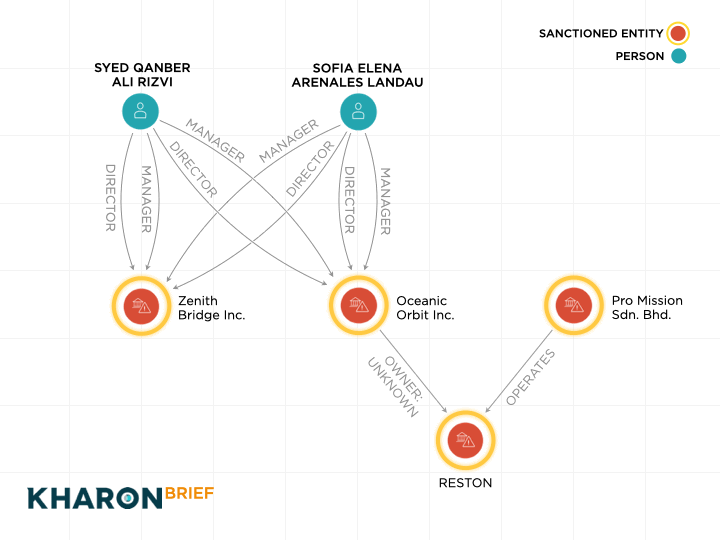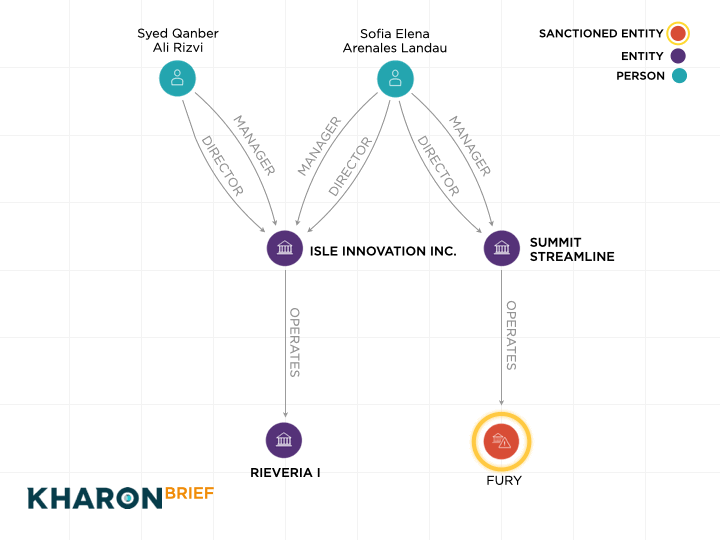Update, 7/3/25: The U.S. State Department on Thursday sanctioned two entities mentioned in this story, the Panama-based commercial manager Isle Innovation, Inc. and the crude-oil tanker RIEVERIA I, for their roles in the trade of Iranian oil.
The flags flown by Iran’s oil-shipping “shadow fleet” span the globe—or at least some very specific parts of it. In a single designation last month, the Trump administration targeted evasion-fueling vessels and companies registered in third countries such as Panama, San Marino, Hong Kong, Barbados and the Seychelles.
These networks often leverage such opaque jurisdictions to blur their connections and risks, allowing their companies and ships to keep supporting Iran’s constrained economy.
The recently sanctioned Panamanian companies Oceanic Orbit Inc. and Zenith Bridge Inc. illustrate these sanctions evasion dynamics in practice. That’s in part because of the largely non-sanctioned network that Kharon charted around them.
INSIDE THE NETWORK: The Treasury Department designated Zenith Bridge in March and Oceanic Orbit in April, both “for operating in the petroleum sector of the Iranian economy,” along with the RESTON, a vessel that Oceanic Orbit owns.
Syed Qanber Ali Rizvi, a UAE-based Pakistani national, and Panamanian national Sofia Elena Arenales Landau manage both firms. Neither individual has been sanctioned.
The flags flown by Iran’s oil-shipping “shadow fleet” span the globe—or at least some very specific parts of it. In a single designation last month, the Trump administration targeted evasion-fueling vessels and companies registered in third countries such as Panama, San Marino, Hong Kong, Barbados and the Seychelles.
These networks often leverage such opaque jurisdictions to blur their connections and risks, allowing their companies and ships to keep supporting Iran’s constrained economy.
The recently sanctioned Panamanian companies Oceanic Orbit Inc. and Zenith Bridge Inc. illustrate these sanctions evasion dynamics in practice. That’s in part because of the largely non-sanctioned network that Kharon charted around them.
INSIDE THE NETWORK: The Treasury Department designated Zenith Bridge in March and Oceanic Orbit in April, both “for operating in the petroleum sector of the Iranian economy,” along with the RESTON, a vessel that Oceanic Orbit owns.
Syed Qanber Ali Rizvi, a UAE-based Pakistani national, and Panamanian national Sofia Elena Arenales Landau manage both firms. Neither individual has been sanctioned.

Kharon users can explore this Insight in greater detail through the ClearView platform.
CONNECTING THE DOTS: On top of their two newly sanctioned firms, Rizvi and Landau tie back to a broader web of companies involved in Iran’s shadow fleet.
They both, for instance, manage the Panama-based Isle Innovation Inc. Isle Innovation has not been sanctioned, but its management connections aren’t its only risk point: The company also operates the RIEVERIA I, a vessel that—while it hasn’t been sanctioned, either—has a history of conducting ship-to-ship transfers with Iranian-linked and Russian vessels.
They both, for instance, manage the Panama-based Isle Innovation Inc. Isle Innovation has not been sanctioned, but its management connections aren’t its only risk point: The company also operates the RIEVERIA I, a vessel that—while it hasn’t been sanctioned, either—has a history of conducting ship-to-ship transfers with Iranian-linked and Russian vessels.
FYI: The vessels in these shadow fleet networks often intertwine. According to Bloomberg, the RESTON engaged in a ship-to-ship transfer of oil in February with the LAN JING, a vessel that the Treasury Department had sanctioned for shipping Iranian petrochemicals. Kharon previously reported on a network of 12 vessel-management companies that included the LAN JING’s owner, Harry Victor Ship.
Landau also manages Summit Streamline, a Panama-based shipping company. Summit Streamline owns and operates an oil tanker that the U.S. sanctioned in October for transferring Iranian petroleum products.

Kharon users can explore this Insight in greater detail through the ClearView platform.
Rizvi, meanwhile, serves as an attorney for another Panamanian company that operates a cargo vessel that has sailed to Iranian ports, according to maritime data. In addition to his shipping companies, he wholly owns two import-export companies in Hong Kong.
THE BOTTOM LINE: The Rizvi and Landau case study demonstrates Iran’s continued use of business proxies to facilitate the financing of the regime through its banned petrochemical trade.
These tactics reinforce that a company or vessel doesn’t have to be sanctioned itself, or even be owned or directed by sanctioned individuals, to carry red flags.
Insights break down a Kharon investigation and why it matters, in 3 minutes or less.
More Kharon Insights:
THE BOTTOM LINE: The Rizvi and Landau case study demonstrates Iran’s continued use of business proxies to facilitate the financing of the regime through its banned petrochemical trade.
These tactics reinforce that a company or vessel doesn’t have to be sanctioned itself, or even be owned or directed by sanctioned individuals, to carry red flags.
Insights break down a Kharon investigation and why it matters, in 3 minutes or less.
More Kharon Insights:
- An Alleged Money Launderer’s Network Spans IT Startups and the Sinaloa Cartel
- A Sanctioned Chinese Centrifuge Company Is Liquidating. Its Old Subsidiary Keeps Selling.
- How a Shuffling Turkish Network Kept Shipping Russian Oil After Sanctions
- A BIS-Listed Company Has Ties to China’s Military—and to a US Laser Firm







